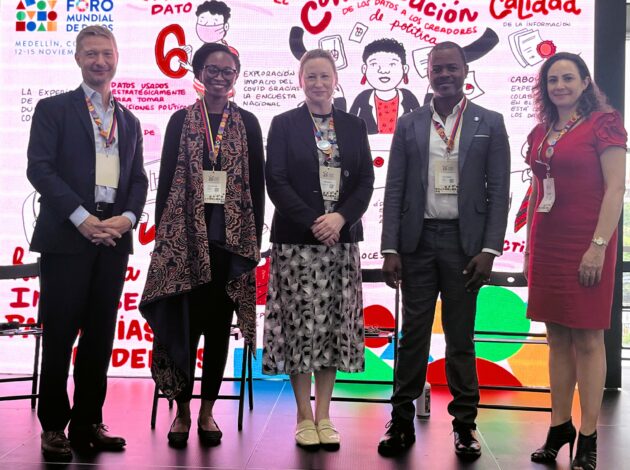Preparing for another pandemic requires learning from the last one. Emma Rourke reflects on two recent events that have highlighted the importance of collaboration between statistical offices and public health institutions.
In the early months of the coronavirus (COVID-19) pandemic, one of the great difficulties was the number of uncertainties surrounding the disease. National Statistical Offices (NSOs) like the ONS helped change that, thanks to their expertise in data collection and analysis. Through collaboration with public health agencies, NSOs across the world contributed to the information needed to better understand the situation and make decisions in a health emergency. Five years later, making the most of the potential from collaborations like these is still something upon which we can improve.
At the World Data Forum in Colombia last year, we showcased the value of such collaborations. The World Health Organisation (WHO) Berlin Hub for Pandemic and Epidemic Intelligence organised a panel, bringing together representatives from NSOs and public health agencies worldwide. Together, we highlighted examples of these organisations working together, and how this has evolved across different regions of the world since the COVID-19 pandemic. My main takeaway message was for countries to build the ‘muscles’ for preparedness that will help us better cooperate and collaborate at an international level for all infectious diseases, not just those that lead to a pandemic.
Developing the Pandemic Preparedness Toolkit
This type of collaboration is also at the core of our Pandemic Preparedness Toolkit (PPT). This project is a five-year long initiative funded by Wellcome to build practical resources that all statistical agencies can use to better prepare for future health crises. The Toolkit is being initially developed with the NSOs in Argentina, Malawi and Nepal, alongside their delivery partners to be a resource especially useful for Low- and Middle-Income Country (LMIC) NSOs.
Each partner has brought new perspective and insights, helping make the PPT an expansive resource that meets the real requirements of NSOs around the world. For example, in Argentina the NSO and delivery partner (CEMIC) have brought experience with coordinating health responses across a federalised country. Meanwhile, the collaboration between the NSO and delivery partner (Luke International) in Malawi shows how government statistical expertise can combine with the non-profit sector. Finally, the delivery partner (HERD International) and the NSO in Nepal have championed the need for engaging diligently with key stakeholders both in government and in the community to inform the toolkit.
In December, we reached a significant milestone when these partners met (virtually) for the first time, bringing together 40 participants from four continents. The energy and shared vision during these workshops were remarkable. When asked to describe the PPT project in three words, our partners repeatedly used terms like “innovative,” “collaborative,” and “relevant”.
One of our key achievements has been finalising the toolkit’s structure. It provides comprehensive resources around five core themes – data collection, data analysis, outputs and reporting, stakeholder engagement and leadership, and data governance.
The results of a survey of a network of NSOs in low- and middle-income countries was also presented, which aimed to identify what they want from such a toolkit. This is one part of our ongoing efforts to ensure we’re meeting real needs on the ground, which is something input from our partners is also helping with.
Universal challenges
What’s particularly striking is how universal many of the challenges are. Despite working across different continents and contexts, our partners share common hurdles and aspirations. This reinforces the value of international collaboration and knowledge-sharing in building more resilient health data systems.
The Berlin Hub’s involvement in our World Data Forum panel signals growing recognition of NSOs’ vital role in pandemic preparedness and response. As we’ve seen, statistical expertise isn’t just about numbers – it’s about providing the reliable, timely information needed and making that information fully accessible so non-analysts can take action to save lives during health emergencies.
As we move into the next phase, we’re focusing on developing user-friendly tools for pandemic preparedness that can be used by NSOs worldwide. But we’re not doing this alone. Through our PPT Global Network, we’re building a community of practitioners who can share experiences and shape the toolkit’s development.
I invite all those interested in strengthening pandemic preparedness to join our PPT Global Network. Whether you’re from a statistical office, public health agency or related organisation, your insights can really help shape this important work.
Emma Rourke is Deputy National Statistician
